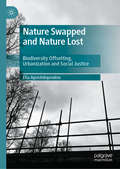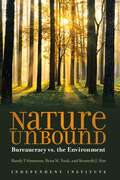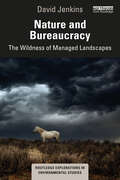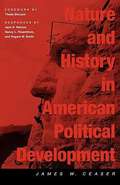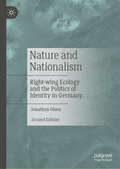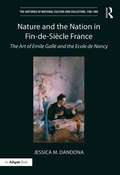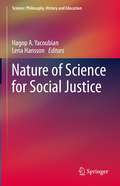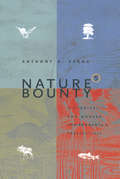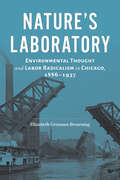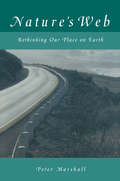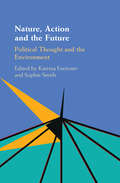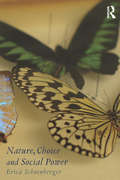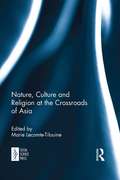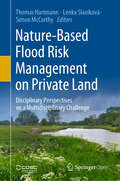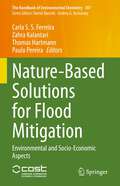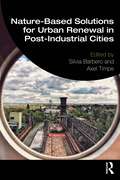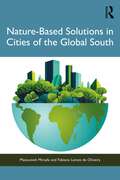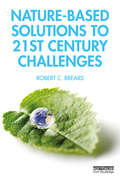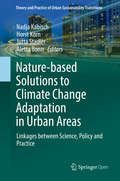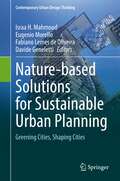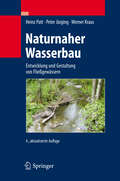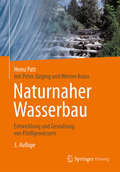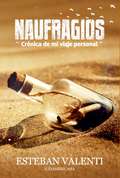- Table View
- List View
Nature Swapped and Nature Lost: Biodiversity Offsetting, Urbanization and Social Justice
by Elia ApostolopoulouThis book unravels the profound implications of biodiversity offsetting for nature-society relationships and its links to environmental and social inequality. Drawing on people’s resistance against its implementation in several urban and rural places across England, it explores how the production of equivalent natures, the core promise of offsetting, reframes socionatures both discursively and materially transforming places and livelihoods.The book draws on theories and concepts from human geography, political ecology, and Marxist political economy, and aims to shift the trajectory of the current literature on the interplay between offsetting, urbanization and the neoliberal reconstruction of conservation and planning policies in the era following the 2008 financial crash. By shedding light on offsetting’s contested geographies, it offers a fundamental retheorization of offsetting capable of demonstrating how offsetting, and more broadly revanchist neoliberal policies, are increasingly used to support capitalist urban growth producing socially, environmentally and geographically uneven outcomes. Nature Swapped and Nature Lost brings forward an understanding of environmental politics as class politics and sees environmental justice as inextricably linked to social justice. It effectively challenges the dystopia of offsetting’s ahistorical and asocial non-places and proposes a radically different pathway for gaining social control over the production of nature by linking struggles for the right to the city with struggles for the right to nature for all.
Nature Unbound: Bureaucracy vs. the Environment
by Ryan M. Yonk Randy T Simmons Kenneth J. SimWhat if what we think we know about ecology and environmental policy is just wrong? What if environmental laws often make things worse? What if the very idea of nature has been hijacked by politics? What if wilderness is something we create in our minds, as opposed to being an actual description of nature?In 1934, former U.S. Forest Service offcial Aldo Leopold, a godfather to the modern environmental movement, wrote that &“restrictive laws&” had &“largely failed&” in their mission to conserve America&’s forests, rivers, and other natural resources. Less than forty years later, however, as various events pushed environmental concerns into the public spotlight, lawmakers from both parties championed legislation far more sweeping and restrictive than any Leopold had witnessed. How well did these &“restrictive laws&” work to right environmental wrongs? Why did so many miss the mark? And how should we go about improving our policies? In Nature Unbound, authors Randy Simmons, Ryan M. Yonk, and Kenneth J. Sim offer a devastating critique of federal environmental policy by scrutinizing it through the lenses of biological ecology and political ecology. This powerful framework, they show, reveals that environmental policy has been guided since the late 1960s by demonstrably false assumptions responsible for a host of ineffective or wasteful, command-and-control policies—on air pollution, water pollution, endangered species, wilderness, renewable energy, and more. The mistakes have also empowered political entrepreneurship in ways that have encroached on property rights, burdened the general public, and degraded the civic landscape. More than a critique of false assumptions and flawed policies, Nature Unbound offers bold principles to help us rethink environmental objectives, align incentives with goals, and af?rm the notion that human beings are an integral part of the natural order and merit no less consideration than Earth&’s other treasures. Ultimately, nothing less can succeed in our efforts to restore natural resources and revitalize our social and political ecosystem.
Nature and Bureaucracy: The Wildness of Managed Landscapes (Routledge Explorations in Environmental Studies)
by David JenkinsThis book questions how bureaucracies conceive of, and consequently interact with, nature, and suggests that our managed public landscapes are neither entirely managed nor entirely wild, and offers several warnings about bureaucracies and bureaucratic mentality. One prominent challenge facing scientists, policymakers, environmental activists, and environmentally concerned citizens, is to recognize that human influence in the natural world is pervasive and has a long history. How we act, or choose not to act, today will continue to determine the future of the natural world. Western-style management of nature, mediated by economic rationality and state bureaucracies, may not be the best strategy to maintain environmental integrity. The question is, what kinds of human influence, conceived of in the widest possible sense, will produce ideal environments for future generations? The related question is, who gets to choose? The author approaches the problem of analyzing the mutual influence of human and natural systems from two perspectives: as an objective scholar investigating bureaucracies and natural systems from the outside, and over the last decade as an inside practitioner working in various roles in federal land management agencies developing policies and regulations involved in the control of natural systems. This book will be of great interest to students and scholars of natural resource management, policy and politics, and professionals working in environmental management roles as well as policymakers involved in public policy and administration.
Nature and History in American Political Development: A Debate (Alexis De Tocqueville Lectures in American Politics #1)
by Theda Skocpol Jack Rakove Nancy Rosenblum James Ceaser Rogers SmithIn this inaugural volume of the Alexis de Tocqueville Lectures, James Ceaser traces the way certain "foundational" ideas—including nature, history, and religion—have been understood and used over the course of American history. Ceaser treats these ideas as elements of political discourse that provide the ground for other political ideas, such as liberty or equality. Three critical commentators challenge Ceaser's arguments, and a spirited debate about large and enduring questions in American politics ensues.
Nature and Liberty
by Dr John Zvesper John ZvesperLiberal democracy, it has been claimed, stands at the end of history. But there are hidden internal strains that could threaten its fabric.Nature and Liberty explores three of the most important practical problems of modern liberal politics - those connected with ethnicity and race, sex and the family, and bureaucratized government. The author traces liberals' difficulties in dealing with these problems to their own reluctance to have recourse to nature as a guide for political life.
Nature and Nationalism: Right-wing Ecology and the Politics of Identity in Germany
by Jonathan OlsenIn this new edition of his now classic 1999 book, Jonathan Olsen explores the relationship between the far right and the environment, or what he terms “right-wing ecology.” Arguing that radical environmentalism is not exclusively a domain of the left, Olsen shows how many of Germany's far right parties and groups ground their ecological ideology in an anti-universalist anthropology which sees human beings as naturally 'rooted' in specific nations and cultural traditions. Pollution in this discourse signifies not only the disruption of the natural world, but the social world as well, thus providing an environmental justification for an anti-immigrant politics which finds resonance outside the specific milieu of the far right. A rigorously theoretical book, Nature and Nationalism challenges our understanding of the deeply ambiguous ways in which 'nature' functions to legitimate a wide variety of political ideas.
Nature and the Nation in Fin-de-Siècle France: The Art of Emile Gallé and the Ecole de Nancy (The Histories of Material Culture and Collecting, 1700-1950)
by Jessica M. DandonaBy the time of his death in 1904, critics, arts reformers, and government officials were near universal in their praise of Art Nouveau designer Emile Gallé (1846–1904), whose works they described as the essence of French design. Many even went so far as to argue that the artist’s creations could reinvigorate France’s fading arts industries and help restore its economic prosperity by defining a modern style to represent the nation. For fin-de-siècle viewers, Gallé’s works constituted powerful reflections on the idea of national belonging, modernity, and the role of the arts in political engagement. While existing scholarship has largely focused on the artist’s innovative technical processes, a close analysis of Gallé’s works brings to light the surprisingly complex ways in which his fragile creations were imbricated in the political turmoil that characterized fin-de-siècle France. Examining Gallé’s works inspired by Japanese art, his patriotically inflected designs for the Universal Exposition of 1889, his artistic manifesto in support of Dreyfus created in 1900, and finally, his late works that explore the concept of evolution, this book reveals how Gallé returns again and again to the question of national identity as the central issue in his work.
Nature of Science for Social Justice (Science: Philosophy, History and Education)
by Hagop A. Yacoubian Lena HanssonThis edited volume brings closer two contemporary science education research areas: Nature of Science (NOS) and Social Justice (SJ). It starts a dialogue on the characteristics of NOS for SJ with the purpose of advancing the existing discussion and creating new avenues for research. Using a variety of approaches and perspectives, the authors of the different chapters engage in a dialogue on the construct of NOS for SJ, its characteristics, as well as ways of addressing it in science classrooms. Issues addressed are related to why a school science aiming at SJ should address NOS; what NOS-related content, skills and attitudes form the basis when aiming at SJ; and how school science can address NOS for SJ. Through a set of theoretical and empirical chapters, the authors suggest answers, but they also pose new questions on what NOS for SJ can mean, and what issues need to be taken into consideration in future research and practice.
Nature's Bounty: Historical and Modern Environmental Perspectives
by Anthony N. PennaThis thorough, clearly organized text focuses on four major environmental categories: forests and land, wildlife and wildlife habitat, water and drinking water quality, and air. Each category is treated historically from the time of exploration and discovery in the seventeenth century to the present. There are also discussions on environmental public policy issues currently in our national debate. The text is integrated throughout with fascinating primary source documents -- eyewitness accounts, government reports and documents, speeches, and congressional testimony -- which illuminate the material.
Nature's Laboratory: Environmental Thought and Labor Radicalism in Chicago, 1886–1937
by Elizabeth Grennan BrowningThe untold history of how Chicago served as an important site of innovation in environmental thought as America transitioned to modern, industrial capitalism.In Nature's Laboratory, Elizabeth Grennan Browning argues that Chicago—a city characterized by rapid growth, severe labor unrest, and its position as a gateway to the West—offers the clearest lens for analyzing the history of the intellectual divide between countryside and city in the United States at the end of the nineteenth century. By examining both the material and intellectual underpinnings of Gilded Age and Progressive Era environmental theories, Browning shows how Chicago served as an urban laboratory where public intellectuals and industrial workers experimented with various strains of environmental thinking to resolve conflicts between capital and labor, between citizens and their governments, and between immigrants and long-term residents. Chicago, she argues, became the taproot of two intellectual strands of American environmentalism, both emerging in the late nineteenth century: first, the conservation movement and the discipline of ecology; and second, the sociological and anthropological study of human societies as "natural" communities where human behavior was shaped in part by environmental conditions. Integrating environmental, labor, and intellectual history, Nature's Laboratory turns to the workplace to explore the surprising ways in which the natural environment and ideas about nature made their way into factories and offices—places that appeared the most removed from the natural world within the modernizing city. As industrialization, urbanization, and immigration transformed Chicago into a microcosm of the nation's transition to modern, industrial capitalism, environmental thought became a protean tool that everyone from anarchists and industrial workers to social scientists and business managers looked to in order to stake their claims within the democratic capitalist order. Across political and class divides, Chicagoans puzzled over what relationship the city should have with nature in order to advance as a modern nation. Browning shows how historical understandings of the complex interconnections between human nature and the natural world both reinforced and empowered resistance against the stratification of social and political power in the city.
Nature's Wealth
by Pieter J. H. van Beukering Elissaios Papyrakis Jetske Bouma Roy Brouwer Pieter J. H. van Beukering Elissaios Papyrakis Jetske BoumaIncreasing pressure from economic development and population growth has resulted in the degradation of ecosystems around the world and the loss of the essential services that they provide. Understanding the linkages between ecosystem service provisioning and human well-being is crucial for the establishment of effective environmental and economic development policy. Presenting new insights into the relationship between ecosystem services and livelihoods in developing countries, this book takes up the challenge of assessing these links to demonstrate their importance in policy development. It pays special attention to innovative management opportunities that improve local livelihoods and alleviate poverty while enhancing ecosystem protection. Based on eighteen studies in more than twenty developing countries, the authors explore the role of biodiversity-, marine-, forest-, water- and land-related ecosystem services, making this an invaluable contribution to research on the role of ecosystems in supporting the livelihoods of the poor around the world.
Nature's Web: Rethinking Our Place on Earth (Cassell Global Issues Ser.)
by Peter MarshallThis powerful book provides the first comprehensive overview of the intellectual roots of the worldwide environmental movement - from ancient religions and philosophies to modern science and ethics - and synthesizes them into a new philosophy of nature in which to ground our moral values and social action. It traces the origins and evolution of the dominant worldview that has built our industrial, technocratic, man-centered civilization, and brought us to the current ecological crisis. At the same time, it uncovers an alternative cultural tradition in the world's different religions and philosophies and describes how these ideas are now surfacing and coalescing to form an ecological sensibility and a new vision of nature which recognizes the inter-relatedness of all living things. Finally, this book integrates these varied traditions with modern physics and the science of ecology into a larger philosophical whole that provides the environmental movement with a comprehensive vision of an organic and sustainable society in harmony with nature. As ecological disasters continue to threaten our planet, becoming worse with every passing moment of indifference, it has become clear that we must take action. We must change our relationship with nature, and return to the days when our lives were intimately connected to and dependent upon the natural world. Nature's Web lays the foundations for that change by explaining where our complex ideas about nature come from, why they are wrong, and what we can do to change them.
Nature, Action and the Future: Political Thought and the Environment
by Katrina Forrester Sophie SmithClimate change is one of the great challenges of modern politics. In this volume, leading political theorists and historians investigate how the history of political ideas can help us make sense of it. The contributors add a historical perspective to contemporary debates in political theory. They also show that the history of political thought offers new directions for thinking about the environment today. By situating the relationship between humans and nature within a wider history of ideas, the essays provide alternative ways of thinking about the most intractable problems of environmental politics - the status of science in modern democracies, problems of collective action, and the challenges of fatalism. This volume will create new avenues of research for scholars and students in the history of political thought. It is essential reading for undergraduate students interested in environmental challenges: both those in politics seeking a historical perspective, and those in history who want to link their studies to the present.
Nature, Choice and Social Power
by Erica SchoenbergerWe are at an environmental impasse. Many blame our personal choices about the things we consume and the way we live. This is only part of the problem. Different forms of social power - political, economic and ideological - structure the choices we have available. This book analyses how we make social and environmental history and why we end up where we do. Using case studies from different environmental domains – earth and water, air and fire – Nature, Choice and Social Power examines the form that social power takes and how it can harm the environment and hinder our efforts to act in our own best interests. The case studies challenge conventional wisdoms about why gold is valuable, why the internal combustion engine triumphed, and when and why suburbs sprawled. The book shows how the power of individuals, the power of classes, the power of the market and the power of the state at different times and in different ways were critical to setting us on a path to environmental degradation. It also challenges conventional wisdoms about what we need to do now. Rather than reducing consumption and shrinking from outcomes we don’t want, it proposes growing towards outcomes we do want. We invested massive resources in creating our problems; it will take equally large investments to fix them. Written in a clear and engaging style, the book is underpinned with a political economy framework and addresses how we should understand our responsibility to the environment and to each other as individuals within a large and impersonal system.
Nature, Culture and Religion at the Crossroads of Asia (Social Science Press Ser.)
by Marie Lecomte-TilouineThis book explores how ethnic groups living in the Himalayan regions understand nature and culture. The first part addresses the opposition between nature and culture in Asia’s major religious traditions such as Hinduism, Buddhism, Islam and Shamanism. The second part brings together specialists of different representative groups living in the heterogeneous Himalayan region. They examine how these indigenous groups perceive their world. This includes understanding their mythic past, in particular, the place of animals and spirits in the world of humans as they see it and the role of ritual in the everyday lives of these people. The book takes into account how these various perceptions of the Himalayan peoples are shaped by a globalized world. The volume thus provides new ways of viewing the relationship between humans and their environment.
Nature-Based Flood Risk Management on Private Land: Disciplinary Perspectives on a Multidisciplinary Challenge
by Thomas Hartmann Lenka Slavíková Simon McCarthyThis open access book addresses the various disciplinary aspects of nature-based solutions in flood risk management on private land. In recent decades, water management has been moving towards nature-based solutions. These are assumed to be much more multi-purpose than traditional “grey infrastructures” and seem to be regarded as a panacea for many environmental issues. At the same time, such measures require more – and mostly privately owned – land and more diverse stakeholder involvement than traditional (grey) engineering approaches. They also present challenges related to different disciplines. Nature-based solutions for flood risk management not only require technical expertise, but also call for interdisciplinary insights from land-use planning, economics, property rights, sociology, landscape planning, ecology, hydrology, agriculture and other disciplines to address the challenges of implementing them. Ultimately, nature-based flood risk management is a multi-disciplinary endeavor. Featuring numerous case studies of nature-based flood risk management accompanied by commentaries, this book presents brief academic reflections from two different disciplinary perspectives that critically highlight which specific aspects are of significance, and as such, underscore the multi-disciplinary nature of the challenges faced.
Nature-Based Solutions for Flood Mitigation: Environmental and Socio-Economic Aspects (The Handbook of Environmental Chemistry #107)
by Thomas Hartmann Paulo Pereira Carla S. S. Ferreira Zahra KalantariThis book provides an overview of the typical nature-based solutions (NBS) used for flood mitigation at different scales and in different areas (e.g. from catchment to hillslope scale; from urban to coastal areas). NBS can provide several ecosystem services, such as water regulation and water quality enhancement, and as such offer relevant technical solutions to complement typical grey infrastructures to mitigate flood hazard and water quality problems. In recent years, political awareness and interest from the scientific community have led to increasing implementation of NBS worldwide. In light of this trend, this book provides valuable insights into the environmental aspects of NBS, particularly their effectiveness for flood and pollution mitigation, and discusses socio-economic aspects related to the implementation of NBS, including regulatory aspects, cost, and citizens’ perceptions of NBS. Compiling the latest research, the book furthers our understanding of the role of NBS for flood mitigation and its relation to environmental aspects, to guide scientists and stakeholders in future NBS projects. It is intended for the scientific community and stakeholders, such as spatial planners and landscape managers.Chapter "Nature-based solutions for flood mitigation and resilience in urban areas" is available open access under a Creative Commons Attribution 4.0 International License via link.springer.com.
Nature-Based Solutions for Urban Renewal in Post-Industrial Cities
by Silvia Barbero Axel TimpeThis book, based on the experiences and insights gained during the Horizon 2020 project proGIreg, offers a detailed overview of targeted nature-based solutions and their impacts on various key sustainability areas, guiding readers through the spatial analysis, co-design, and implementation processes of cities in Europe and Asia. Chapters shed light on the challenges and opportunities encountered in each location, including Germany, Italy, Croatia, Bosnia and Herzegovina, Greece, Portugal, Romania and China. It also shares essential lessons learned and a wide range of indicators crucial for assessing the benefits of nature-based solutions on social innovation, circular economy, biodiversity, and health. Finally, the focus of this book shifts to the future of nature-based solutions as catalysts for new and green community economies as well as policies aimed at addressing climate change and urban renewal. The lessons and insights from the projects highlighted in this book will be valuable for urban planners and policymakers worldwide, as well as for a broader audience interested in nature-based solutions and urban regeneration.The Open Access version of this book, available at www.taylorfrancis.com, has been made available under a Creative Commons CC-BY 4.0 license.
Nature-Based Solutions in Cities of the Global South
by Masoumeh Mirsafa Fabiano Lemes de OliveiraThis book explores the practice of Nature-Based Solutions (NBS) in the cities of the Global South. NBS are recognized as a key strategy for achieving sustainable development, and they are being implemented in a variety of sectors such as urban planning, agriculture, forestry, and water management. They offer a wide range of benefits, but there is a gap between research and practice across cities from the Global South. This book promotes implemented urban NBS projects in the Global South to help identify region-specific challenges and opportunities, and to develop more effective and equitable solutions. The presented case studies support resilient planning in the Global South and significantly inform urban debates in the Global North. This book offers pragmatic policy and planning recommendations, providing decision-makers with clear guidance on implementing NBS in urban settings and transforming knowledge into actionable strategies for sustainable and resilient urban development.
Nature-Based Solutions to 21st Century Challenges
by Robert C. BrearsThis book provides a systematic review of nature-based solutions and their potential to address current environmental challenges. In the 21st century, society is faced by rapid urbanisation and population growth, degradation and loss of natural capital and associated ecosystem services, an increase in natural disaster risks, and climate change. With growing recognition of the need to work with ecosystems to resolve these issues there is now a move towards nature-based solutions, which involve utilising nature’s ecosystem to solve societal challenges while providing multiple co-benefits. This book systematically reviews nature-based solutions from a public policy angle, assessing policy developments which encourage the implementation of nature-based solutions to address societal challenges while simultaneously providing human well-being and biodiversity benefits. This includes enhancing sustainable urbanisation, restoring degraded ecosystems, mitigating and adapting to climate change, and reducing risks from natural disasters. While nature-based solutions can be applied strategically and equitably to help societies address a variety of climatic and non-climatic challenges, there is still a lack of understanding on how best to implement them. The book concludes by providing a best practice guide for those aiming to turn societal challenges into opportunities. This book will be of great interest to policymakers, practitioners and researchers involved in nature-based solutions, sustainable urban planning, environmental management, and sustainable development generally.
Nature-Based Solutions to Climate Change Adaptation in Urban Areas: Linkages between Science, Policy and Practice (Theory and Practice of Urban Sustainability Transitions)
by Aletta Bonn Nadja Kabisch Horst Korn Jutta StadlerThis open access book brings together research findings and experiences from science, policy and practice to highlight and debate the importance of nature-based solutions to climate change adaptation in urban areas. Emphasis is given to the potential of nature-based approaches to create multiple-benefits for society.The expert contributions present recommendations for creating synergies between ongoing policy processes, scientific programmes and practical implementation of climate change and nature conservation measures in global urban areas.Except where otherwise noted, this book is licensed under a Creative Commons Attribution 4.0 International License. To view a copy of this license, visit http://creativecommons.org/licenses/by/4.0/
Nature-based Solutions for Sustainable Urban Planning: Greening Cities, Shaping Cities (Contemporary Urban Design Thinking)
by Fabiano Lemes de Oliveira Davide Geneletti Israa H. Mahmoud Eugenio MorelloUrban greening policies and measures have recently shown a high potential impact on the design and reshaping of the built environment, especially in urban regeneration processes. This book provides insights on analytical methods, planning strategies and shared governance tools for successfully integrating Nature-Based Solutions (NBS) in the urban planning practice. The selected contributions present real-life application cases, in which the mainstreaming of NBS are investigated according to two main challenges: the planning and designing of physical and spatial integration of NBS in cities on one side, and the implementation of suitable shared governance models and co-creation pathways on the other. Chapter 5 is available open access under a Creative Commons Attribution 4.0 International License via link.springer.com.
Naturnaher Wasserbau
by Heinz Patt Peter Jürging Werner KrausDer Autor stellt die wichtigsten Grundlagen für die Planung und Durchführung naturnaher Maßnahmen an Fließgewässern dar. Dabei behandelt er Technik und Ökologie als gleichwertige Partner. Hinweise zur aktuellen rechtlichen Situation, zum Planungsablauf sowie neue Aspekte der Gewässerunterhaltung sind ebenso enthalten wie hydrologische, hydraulische und sedimentologische Grundlagen. Die 4. Auflage berücksichtigt die Neufassungen zahlreicher Gesetze, u. a. des Bundesnaturschutzgesetzes, sowie das seit April 2010 gültige Wasserhaushaltsgesetz.
Naturnaher Wasserbau: Entwicklung und Gestaltung von Fließgewässern
by Heinz PattDer Autor stellt die wichtigsten Grundlagen für die Planung und Durchführung naturnaher Maßnahmen an Fließgewässern dar. Dabei behandelt er Technik und Ökologie als gleichwertige Partner. Hinweise zur aktuellen rechtlichen Situation, zum Planungsablauf sowie neue Aspekte der Gewässerunterhaltung sind ebenso enthalten wie hydrologische, hydraulische und sedimentologische Grundlagen. Die 4. Auflage berücksichtigt die Neufassungen zahlreicher Gesetze, u. a. des Bundesnaturschutzgesetzes, sowie das seit April 2010 gültige Wasserhaushaltsgesetz.
Naufragios: Crónica de mi viaje personal
by Esteban ValentiPersonaje polémico si los hay, Esteban Valenti se propone abrir esta "ventana de sinceridad" para exponer su camino vital, no exento de contradicciones, fallos y desengaños. Esteban Valenti plantea en este libro una revisión de su vida, las peripecias que ha tenido a lo largo de los años, y su participación en el accionar político desde diversos ámbitos. Se revela como una personalidad compleja, por momentos contradictoria, que ha dedicado la mayor parte de su existencia a la participación en la actividad política. Este libro finaliza analizando el fracaso del proyecto La Alternativa, y revelando los pormenores de ese proceso.
